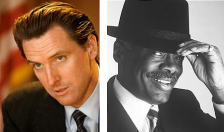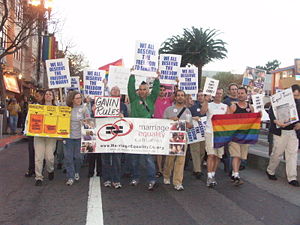San Francisco Bay Guardian, 2004-02-04, v38-n19 - 19jim
The Political Puppeteer
Campaign attorney Jim Sutton has used his connections, legal knowledge, and aggressive strategies to become the go-to guy in San Francisco politics.
By Savannah Blackwell
By offering envelope-pushing legal and political advice at key moments in the fall campaign, attorney Jim Sutton was perhaps the single most influential individual behind the victories of Mayor Gavin Newsom and District Attorney Kamala Harris.
In the process, Sutton solidified his reputation as the dark prince of San Francisco elections, a hired gun who helps downtown interests and well-funded campaigns continue to dominate the electoral field even after voters passed reforms that restricted campaign giving and spending and required more official disclosure.
“He knows more election law than anyone, and he knows it better than anyone else,” local political consultant David Looman told the Bay Guardian. “He is the guy you call.”
New era, new player
Sutton, 40, stepped on the political stage just as voters were going to the polls in the fall of 1997 to demand more transparency in campaigns, a reaction to the leadership of Mayor Willie Brown and the dealings of powerhouse consultants like Jack Davis and Robert Barnes. At the time Sutton worked for Nielsen, Merksamer, Parrinello, Mueller, and Naylor, a Mill Valley firm that specializes in election law.
Sutton took on mostly big-money campaigns backed by downtown interests — such as Brown’s 1999 reelection and Pacific Gas and Electric Co.’s successful, multimillion-dollar bids to squelch the public power movement in 2001 and 2002. Highly versed in the minutia of campaign finance law, he became a major player in electoral politics in San Francisco — and across the state.
“He is one of a small handful of very influential political law attorneys who typically represent moneyed, influential candidates,” California Common Cause executive director Jim Knox told us. “And he seems to be on something of a crusade right now.”
A search of the San Francisco Ethics Commission's online database shows that over the past six years, Sutton has acted as treasurer or in another legal capacity for at least 20 campaigns and counts such heavily funded political action committees as the Golden Gate Restaurant Association, the Alice B. Toklas Lesbian Gay Bisexual Transgender Democratic Club, and the San Francisco Association of Realtors among his permanent clients. For that work, which doesn’t include the fall election, he earned at least $750,000.
Many of the city's progressive activists and leaders see him as a dark agent — a tool only well-heeled interests can hire to navigate regulatory loopholes in order to spend as much as possible, even it means pushing the limits of the law, to sway voters.
“He's an opportunistic lawyer who works against populist issues,” Sup. Tom Ammiano said.
Moreover, activists and state campaign finance experts say, he exerts an extraordinary level of influence over the city's campaign regulators, including the top staff at the Ethics Commission and the deputy city attorneys who work with that agency.
“He is a high-powered fixer who has relationships with people in power that let him deliver for his clients in a way that leaves the less-connected among us flabbergasted," said Marc Solomon, a Green Party member who worked on Sup. Matt Gonzalez's mayoral campaign.
For his part, Sutton says that's nonsense.
“There's absolutely no proof or evidence of that,” Sutton told us. “I'm a professional, and I don't want special access. I don't need it, because I have a knowledge of the law.”
Rising to the top
By the time Sutton left his old firm last May to create Sutton and Associates, he had sealed his reputation as a go-to guy and counted among his clients the man who would be mayor. Sutton was everywhere. Consider:
• Having lawyered Newsom through the embarrassing flap in early 2003 over the $1 million loan from mentor Gordon Getty that (whoops!) Newsom neglected to disclose on his economic interest statements, Sutton served as treasurer to the Marina District supervisor's mayoral campaign.
• When district attorney candidate Harris's consultants realized their client was facing disaster if they couldn't get her out of a legally binding pledge she signed in January 2003 to abide by the spending limits set in that race, they summoned Sutton, who got her out of the jam. The Ethics Commission's decision to lift the spending limit was one of the agency's most egregious acts in years and was truly an extraordinary event, activists say. It allowed Harris to spend hundreds of thousands of dollars to get past Bill Fazio in the runoff and eventually beat incumbent Terence Hallinan.
• Sutton handled the regulatory filing procedures for the California Urban Issues Project, a nonprofit lobbying outfit that churned out campaign mailers slamming Hallinan and mayoral contender Gonzalez for, among other charges, an unwillingness to crack down on the activities of homeless people. Though the group's status prevents it from taking positions on candidates, the mailers clearly favored one candidate over the other. However, since the pieces didn't actually include a “vote for candidate X” command, they fell within the bounds of the law as recently interpreted by the appellate courts, Sutton told us.
“What I do is say, ‘I am the lawyer. It's my job to say this is what the law says. This is what it does or doesn't allow,’ ” Sutton said. “It's not about any kind of ideology on my part.”
• Sutton also served as treasurer for the campaigns behind two successful measures funded by downtown interests: the clean-streets initiative (Proposition C) and the controversial anti-panhandling legislation sponsored by Newsom (Proposition M). Interestingly, Harris particularly benefited because of her support for Prop. M. San Francisco pollster David Binder told us in December that her position on Prop. M helped her win over much of Fazio's base and was key to her victory.
• Sutton's expertise helped Newsom and Harris raise money in larger chunks during the runoff than they might otherwise have done. That's because Sutton is keenly aware of a detail in the city’s campaign finance law that says if a candidate carries “accrued expenses” from the general election to the runoff, that candidate can collect $500 (instead of $250) from contributors. He should be — the ruling came as a result of his suggestion to local regulators.
For practical purposes, it can become a matter of shuffling the books. Newsom and Harris had so much cash behind their candidacies that it's tough to believe they had any real debt. And in the case of at least Newsom, the amount of “debt” certainly seemed to be a moving target.
Shortly after the general election, Newsom campaign manger Eric Jaye told us he thought Newsom bore roughly $30,000 in accrued expenses. But when the campaign filed the paperwork, Newsom showed $225,322 in unpaid bills (see “Tainted Dough,” 12/03/03).
Neither Hallinan's nor Gonzalez's campaign took advantage of this provision in the law, even though Gonzalez treasurer Randy Knox brought it to the candidate's attention. Gonzalez told us at the time that he didn't consider such a move ethical.
Learning the ropes
A self-described politics nerd who interned in his state assemblymember's office in high school, Sutton credits the rigors of the tight-knit environment of Pomona College — more than his three years at Stanford University Law School — with influencing the way he works today.
“I learned early I wasn't going to get away without doing my homework,” he told us.
After clerking for former California Supreme Court Justice Edward Panelli from 1988 to 1989, he searched for a way to combine his legal degree with his keen interest in politics and government. In 1990 he found his way to Nielsen, Merksamer, though he lived, as he still does, in San Francisco.
Since he knew the city, he evolved into the firm's attorney who dealt with San Francisco matters, he told us, even though he's a member of the Republican Party — a rare bird here. In fact, he even served a stint as general counsel for the California Republican Party.
His first work in the city was on behalf of large institutions — the M.H. de Young Memorial Museum's early bond campaigns, for example. He also made a key alliance with consultant Barnes, who was on his way to building a hugely influential career here and becoming closely connected to former mayor Brown.
In spring 1998, Sutton acted as treasurer for Bay Beautiful, a PAC aimed at defeating Proposition K, which former state senator Quentin L. Kopp put on the ballot to restrict Brown's control of the development of Treasure Island. (Though the measure passed, the Brown-controlled Board of Supervisors failed to implement it.)
In November 1999, Sutton played a role in the orchestrated independent expenditure campaign on behalf of Brown's reelection efforts in his handling of the Willie Brown Leadership PAC. The PAC directed some $55,000 into Brown's bid for a second term (see “The Soft Money Shuffle,” 2/16/00).
At the time, Sutton had gone public with his strong opposition to efforts to restrict spending in political campaigns, writing in the San Francisco Examiner, “Not only does a spending cap decrease the quantity and quality of the issues discussed in the campaigns, it also infringes on First Amendment rights.”
One year after Brown's reelection, the Leadership PAC, together with the pro-downtown Committee on Jobs, pumped some $67,000 into an unsuccessful bid to defeat Proposition O, which reinstated limits on independent expenditures and provided public financing for campaigns. Sutton handled the legal work for No on O.
No surprise there, Sutton's critics say. Where money seeks to influence politics, that's where you'll find him. Sutton, though, says the list of campaigns he's served doesn't reflect his ideology as much as it does his skill set. He told us the best-funded campaigns “tend to have the more complicated legal questions, since they're going to do more stuff.”
Money and politics
Advocates of campaign finance reform say Sutton has taken his opposition to campaign spending limits on the road, seeking to erode local ordinances that restrict spending.
“Sutton is active all over the state in his opposition to campaign finance reform,” said Paul Ryan, political reform project director for the Los Angeles–based Center for Governmental Studies.
Most recently Sutton testified before the San Diego Ethics Commission at a Jan. 21 hearing on a proposal to strengthen local campaign finance law. Sutton argued the commission should repeal the local law and replace it with the state’s version, which happens to be weaker.
“When we wrote the Political Reform Act of 1974, we put in there that local laws could be stronger than the state law,” Center for Governmental Studies director Bob Stern said. “What we have now is about 100 cities and counties that have gone beyond the state law. What [Sutton] is doing is pushing local jurisdictions to follow the state law only. And that's unfortunate, because each local jurisdiction needs to deal with its own problems."
Sutton said he just wants a uniform standard, with the minimal local amendments.
“[Cities and counties] keep making more and more laws, which are making things more and more complicated and difficult for anyone who wants to run for election to figure out,” Sutton said. “It has a dampening effect.”
Ryan and others are concerned Sutton might succeed in discouraging officials in municipalities such as Los Angeles and San Francisco from sticking by their stronger local laws. Compounding their concerns is that Sutton appears to have a great deal of influence over regulatory officials — at least in San Francisco.
Charlie Marsteller, who formerly headed up a San Francisco chapter of California Common Cause, believes the Ethics Commission has for more than a year failed to act on a complaint he filed against Sutton in late 2002, because of Sutton’s influence on the agency. (The complaint was over Sutton's failure to disclose some $800,000 in contributions from PG&E to a committee aimed at defeating Proposition D, another public power measure.)
“It seems to me they are waiting until after February, when a seat on the commission is up and they'll be able to replace [Bob Planthold] with a Sutton-friendly commissioner," Marsteller said. (Assessor-Recorder Mabel Teng is expected to name Planthold's replacement any day now.)
More recent examples activists point to include the Harris spending-cap matter and the latest: a charge made Jan. 16 by two Ethics Commission staffers that director Ginny Vida ordered the destruction of documents accidentally e-mailed to the agency by a secretary in Sutton's office. Those documents, which were first reported on in the San Francisco Sentinel, strongly suggest that funds raised by the San Francisco Swearing-In Committee (without contribution limits) for Newsom's inauguration were used to pay off a long list of consultants who worked on the campaign — a charge Sutton has vehemently denied.
On Jan. 28, Sutton filed paperwork for the committee reporting contributions but not expenditures. The total raised was $317,850 and included donations of $10,000 to $20,000 from such downtown players as Shorenstein Co., Gap founder Don Fisher, the San Francisco Association of Realtors, and Clear Channel.
Though Sutton insists he enjoys no undue influence on local regulators, even one of Harris's consultants told us Sutton was hired for just that reason. “Jim Sutton has a certain amount of influence with Ginny Vida. He doesn't think [spending limits] are constitutional,” Looman said. “And I believe that worries her too.”
Vida was on medical leave and couldn't reached for comment, but her deputy, Mabel Ng, said neither she nor Vida give Sutton special treatment.
“I don’t think he has any more or any less influence than anyone else,” Ng said.
Dealing with Ethics
Sutton's most impressive act in the Harris controversy was convincing Vida and Ng that Harris didn't know she was bound to the pledge she signed in January 2003 to stay under the spending cap. Had ethics officials concluded that Harris knew her pledge was binding when she blew the cap sometime in September, she would have been disqualified her from the race, according to the terms of the city’s campaign finance law.
Instead the Ethics Commission signed onto a settlement agreement stipulating that Harris's had been an innocent mistake — though there was plenty of evidence that her campaign consultants fully knew the pledge was binding (see Campaign Watch, 9/17/03 and 10/08/03). Vida did not allow key testimony proving the campaign's awareness to be be presented at the commission hearing on the matter, ethics staffers told us, and she did not mention it in her report to the appointed body. After considering only Vida's, that is, Sutton's, version of events and Vida's recommendation going forward (which exactly matched Sutton's proposal to Vida), the commission merely fined Harris and allowed her to keep spending money at a critical time in the race.
“To facilitate the needs of Sutton's clients, [Ethics] staffers gave in to Sutton the way he wanted,” Marsteller said. “The commissioners dropped the ball in that they needed to request an audit to check out the veracity of the statements being made by Harris.... They could hardly decide that the violations by the Harris committee were unintentional absent an audit. It's one of the greatest demonstrations of incompetence I've seen, and Sutton led them into it.”
For his part, Sutton disagrees that Vida gave him an easy of time of it. “They fined [Harris] $34,000, and they made sure we printed flyers and ads telling the public of the mistake,” Sutton said.
That's true. But Ryan and others view the matter as strong evidence of Sutton's influence.
“It appears as though many of the arguments he makes personally are then likewise made by Ginny Vida and Mabel Ng,” Ryan said. “It appears as though Jim Sutton is influencing the public policy and San Francisco and the interpretation of the city's finance laws.” ❖







